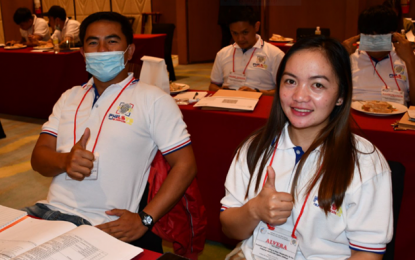
ENUMERATORS. The Philippine Statistics Authority-Cordillera conducted a training of enumerators on Jan. 11 to 14 prior to the rollout of the National Identification System or (PhilSys) in the region on Jan. 18. Villafe Alibuyog, regional director of PSA-CAR, said they are targeting 279,720 to be registered from Jan. 18 to March 31 for the Step 1 of the registration process. (Photo courtesy of PSA-CAR)
BAGUIO CITY – The Philippine Statistics Authority (PSA) in the Cordillera Administrative Region (CAR) expects to register more than 279,000 residents for Step 1 of the National Identification System (PhilSys).
Villafe Alibuyog, PSA-CAR Regional Director, on Tuesday said Step 1 of the registration in the Cordillera started on Jan. 18 and will last until March 31.
She said a total of 279,720 registrants -- 37,800 in Abra, 18,900 in Apayao, 128,520 in Benguet including Baguio City, 34,020 in Ifugao, 34,020 in Kalinga, and 26,460 in Mountain Province are expected to be listed in the process where workers garbed in PSA shirts and with identification cards will go house-to-house to get information of members of the household.
The visit is aimed at preventing people from flocking to registration centers and exposing themselves to the coronavirus disease 2019 (Covid-19) threat.
This strategy was determined by the PSA in compliance with established health and safety measures and security protocols against the threat of Covid-19 and to prevent applicants flocking or crowding the PSA-designated registration centers.
She said PSA-enumerators will get the basic demographic data of a person like full name, sex, date and place of birth, blood type, permanent and present address, nationality, marital status (optional), mobile phone number (optional), and email address (optional).
She said a person will also be asked to present supporting documents such as PSA-issued copy of birth certificate or primary identification documents such as government-issued IDs or a passport as proof of identity of the person whose data is obtained for the national ID.
An appointment transaction slip for the next step of registration under the PhilSys (Step 2) will be given to the applicant.
For Step 2, the person will proceed to the registration center on the date and time given where biometric information of the person will be obtained. This includes the scans of the person’s iris (eyes) and fingers and captures front-facing image of the person.
Step 3 is the issuance of the ID.
Alibuyog said the national ID aims to provide a single national identification system for all citizens and resident aliens in the country as valid proof of identity.
“The PhilSys is expected to simplify public and private transactions, promotes ease of doing business, and enhances integrity of services by eliminating identity fraud, enhances transparency in governance thereby reducing corruption, streamlines delivery of social services especially for the vulnerable groups of the population, and strengthens financial inclusion for both public and private services," she said.
The PhilSys registration is covered by the data privacy law with the government assuring the safety and security of the information relating to each and every Filipino and foreign nationals who are residing in the country.
She said the aim is to register everyone.
“The initial areas with low-income households and low incidence of Covid-19 cases will be prioritized. However, the system will eventually register every qualified applicant and no one shall be left behind,” she said.
Signed into law by President Rodrigo R. Duterte in August 2018, Republic Act 11055, or the Philippine Identification System Act, aims to establish a single national ID for all Filipinos and resident aliens.
The national ID shall be a valid proof of identity that shall be a means of simplifying public and private transactions, enrollment in schools, and the opening of bank accounts.
It will also boost efficiency, especially in dealing with government services where people will only need to present one ID during transactions. (PNA)
